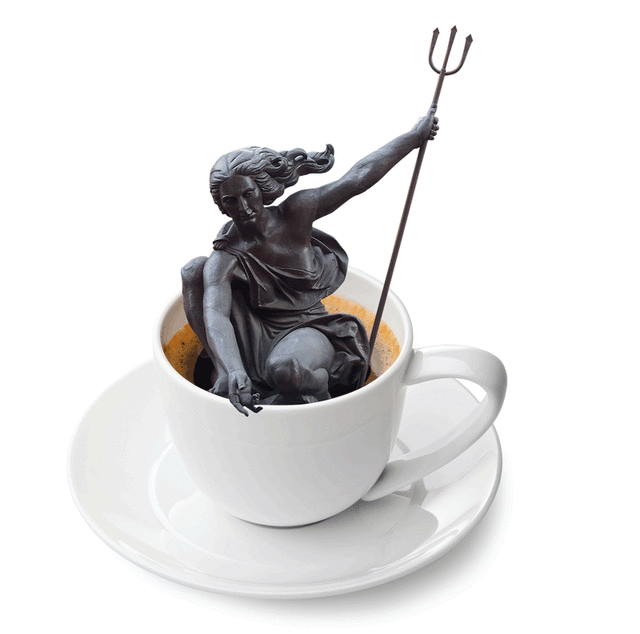The Caffeine Capital

Mark Hellweg started Clive Coffee in 2008 with a plan: sell chic brewing equipment to caffeine obsessives. His single employee—himself—shipped every Technivorm brewer ($265) and precision grinder ($900) from a frigid Southeast Portland warehouse.
In its first year of business, Clive grossed about $1 million. Hellweg soon upgraded to a gallery-like retail showroom, where today polished espresso machines gleam and curving glass carafes glow. You can find such places in many cities. Hellweg’s real distinction—which makes Clive a particularly Portlandian success story—lies in his ambitions not merely to sell, but to make new products and subtly steer his industry. Hellweg hires local craftspeople to design custom products, like a seductive pour-over stand carved from salvaged Oregon walnut. And while the details remain confidential, he plans to start local manufacture of significantly more complex brewing equipment soon.
“Portland is a great place to start a business,” Hellweg says. “There’s this hum of people making things, designing things.”
Thanks to entrepreneurs like Hellweg, Portland’s coffee scene, often viewed just as a symptom of lifestyle geekery run amok, has become an intriguing example of how Portland can reap global influence—and turn that clout into cash.
“People are pausing and saying, ‘there’s something to this.’”
—Matt Lounsbury, Stumptown Coffee
Portland is not a major import center for coffee beans; most of the West Coast’s supply goes through Oakland and Seattle. With $13 billion in global sales, Seattle’s Starbucks probably makes more money in an hour than Portland’s whole coffee world turns over in a year. But when it comes to shaping how the nation and world buy, make, learn about, and consume this small but important daily ritual, the city emerges as a tastemaking power.
Walk into a great café in a stylish foreign capital—Oslo, perhaps, or Mexico City—and you’re very likely to find gear made by Able Brewing Equipment behind the counter. In 2010, Keith Gehrke, cofounder of Portland’s Coava Coffee, designed the Kone, a reusable stainless steel filter for making pour-over coffee. Gehrke left Coava and founded Able in 2012 to focus on perfecting the Kone and the Able Brewing System, a handsome ceramic brewer. He has shipped 5,000 of the steel filters since July.
Gehrke has hired local talent for prototyping, ceramic casting, engineering, web design, photography, branding, and packaging. (Able’s beautiful boxes are an addiction in themselves.) The global coffee elite has hungrily gobbled it up.
Three national coffee magazines based here—Barista, Roast, and Fresh Cup—have made Portland the specialty coffee industry’s media center. They recently were joined by an online competitor, Sprudge.com. Launched in Seattle in 2009 as a tiny news site for coffee insiders, Sprudge moved to Portland last year. Its annual 5 million visitors probably constitute the nation’s largest industry audience and support founders Zachary Carlsen and Jordan Michelman as full-time editor/writers. They hope to take their national reputation global by hiring contributors from coffee-centric cities like London, Seoul, and Melbourne within a few years.
“Portland was supposed to be a one-night stand,” says Michelman, “but now we’re married.”
A new digital start-up, TresPlace, aims to give Portland another national voice. Users of TresPlace will search for high-end cafés across the country and be rewarded with rich profiles featuring writing, photography, and video from local artists. “Portland is the epicenter of specialty coffee,” says cofounder Ryan Michael Weilert, 25, who moved to Portland expressly to launch TresPlace. He is now in hot pursuit of venture capital.
The boldest analogy for this artisan-level business’s potential may come from a different industry. “We don’t grow coffee here,” says economist Joe Cortright. “And we don’t manufacture shoes here. But both Portland’s coffee business and its athletic apparel industry trace their roots to discerning customers.” Portland’s rise in coffee influence echoes the arc the city traveled in footwear as Nike latched on to Oregon’s early-adopter enthusiasm for fitness, then lured designers, and then other companies to start or relocate here.
The leader (if not quite the Phil Knight) of the pack: Stumptown’s Duane Sorenson, who started the company in a broom-closet-size café in 1999 and in 2011 landed a private-equity investment—undisclosed but considered hefty—to fuel expansion. Last summer, the company opened a new 37,000-square-foot headquarters in Southeast Portland, with US Rep. Earl Blumenauer, Mayor Sam Adams, and state Treasurer Ted Wheeler on hand to gnaw through a fat red ribbon with cartoonishly large scissors.
Caffeine is unlikely to spawn a Nike/Adidas-caliber “cluster.” But those taste-fixated customers have fostered businesses (like Stumptown) built around fine-grained details (like tiny batches of ultrapremium beans purchased from individual farms) that few focused on before. If Portland has an edge in this world, it may be the guts to chase the next trend—a pioneering ethic the leaders of our coffee vanguard share.



